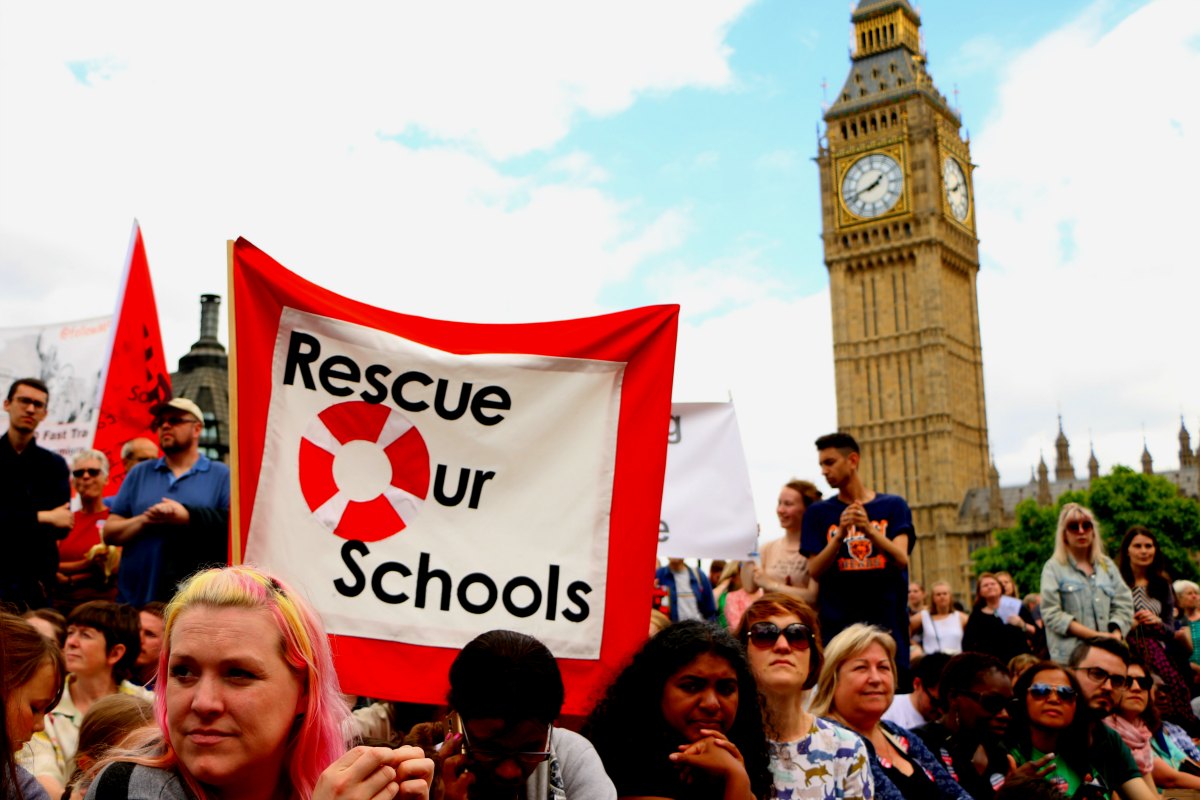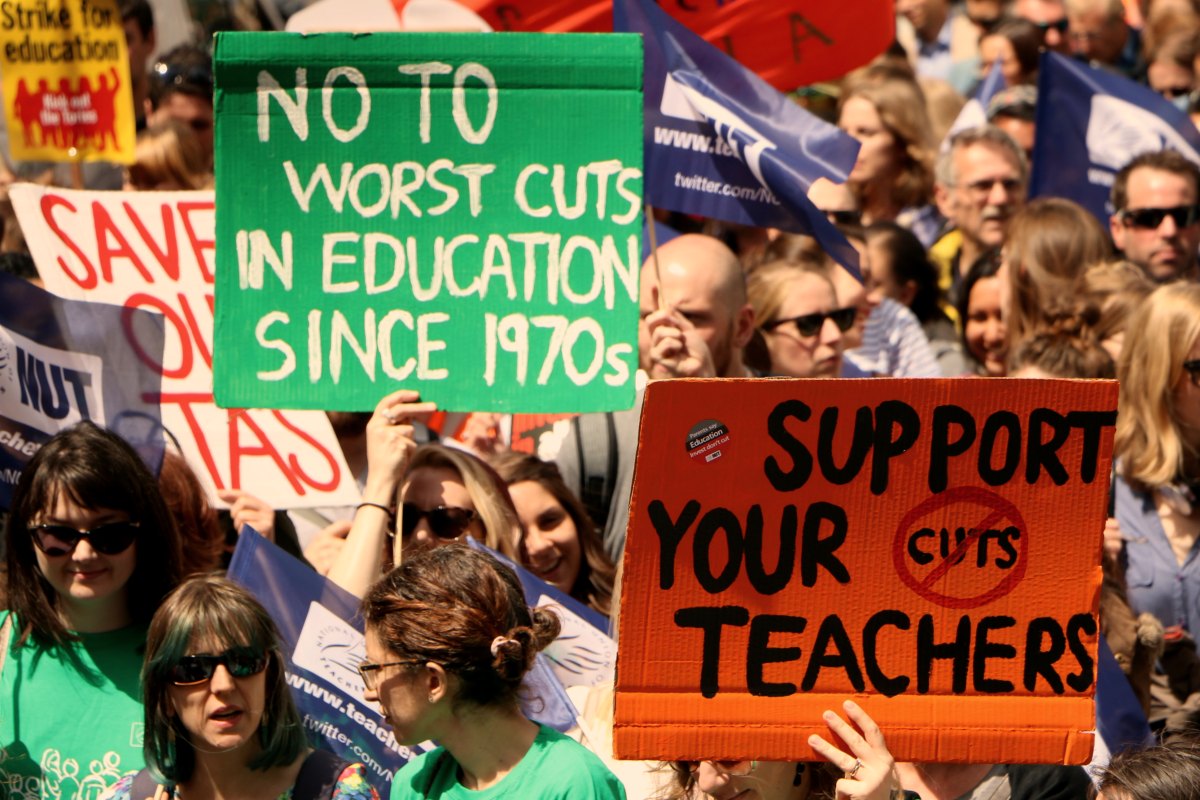Britain’s schooling system is in crisis, with funding slashed, teachers overworked and underpaid, and students facing an uncertain future. The only way out is on the basis of a bold socialist alternative.
Young people across Britain are facing a mental health epidemic. Almost four-in-five teachers saw a pupil struggle with mental health difficulties in 2018, the most common problem being anxiety. In the last year alone, Childline provided more than 1,400 counselling sessions to children regarding exam related anxiety – up by around 50% on four years ago.
As such, much discussion is taking place on how to transform education to fix this crisis. One article entitled What if schools valued wellbeing more than results?, written for the Times Educational Supplement (TES) by Dr Tara Porter, clinical psychologist at the Royal Free London NHS Trust, has received praise by some on the Labour left as a model for progressive education.
There is much in this article which is laudable. But as long as schooling is stuck within the confines of a capitalist economy, Dr Porter’s vision will only ever be realised in a blurred and distorted form.
Dr Porter contextualises her argument in a world where governments are currently setting their budgets “with the aim of stability and growth”. She describes how, in her view, the New Zealand government is taking an alternative position by setting its budget not around monetary aims, but around wellbeing aims. Dr Porter then raises the question: “What if we did this in education?”
Her proposal highlights the importance of good mental health. She advocates making the primary purpose of schooling the education of children for happy and healthy lives. Successful schools, she writes, would not be those with the most entries to top universities, but those with the “ability to produce mentally well grown-ups”.
Dr Porter continues: “A move to a wellbeing culture would mean that less-academic pupils would be encouraged to become well-rounded, law-abiding, productive citizens, at peace with themselves.”
In addition, Dr Porter recommends desegregated schools that cross class, race, ethnicity and religion, and promote the importance of the environment as a way to promote well-being.
Important to Dr Porter’s vision is to put the minds of business and commerce at rest. She does this by describing how her ideas for wellbeing schools will produce not just happier workers, but more productive ones too.
No one could object to much of Dr Porter’s vision of an education system that wants to genuinely place a person’s wellbeing and happiness at the centre of its mission. However, despite the best efforts of our teachers, who are forced to work under intolerable pressures, schooling within a capitalist economy has and always has had a very different mission – one that Dr Porter’s vision fails to challenge.
Schooling under capitalism
 It is important to remind ourselves of the role of schooling in capitalist society. Schools, teachers and their pupils are locked into the social and economic structure in which they function. That structure is capitalism – a social and economic system currently in crisis.
It is important to remind ourselves of the role of schooling in capitalist society. Schools, teachers and their pupils are locked into the social and economic structure in which they function. That structure is capitalism – a social and economic system currently in crisis.
Essentially, schooling under capitalism mirrors and reproduces the hierarchical class relationships in wider society. As T.S. Eliot once wrote: “The function of schooling is to preserve the class and select the elite.”
The history of schooling for the working class has been both short and stark; a history that reveals how, right from the start, the class system has dictated the nature and remit of schools.
State schools today find themselves more and more returning to an increasingly explicit objective of the production and reproduction of ‘labour power’ – people’s capacity to work and sell their labour as a commodity. This labour power is bought up by the bosses and put to use in order to make profits.
One ex-headteacher, Fred Sedgewick, describing a culture of overly-excessive accountability of teachers, wrote in the early noughties: “Most classrooms are now the extensions of our bosses’ offices…the bosses look through glass doors, the glass windows, to check what we the teachers are doing.”
Now, with multi-academy trusts run in many cases directly by businesses, they don’t just peer in the classrooms to observe lessons: they dictate curriculums, run the schools, and hold teachers to account.
Transformation
 To escape this kind of schooling, it is necessary to kick big business out of education, as part of a wider socialist programme that transforms the economy to be run for needs, not profits. In short, Dr Porter’s vision for education and wellbeing can only be achieved with an accompanying vision for transforming society.
To escape this kind of schooling, it is necessary to kick big business out of education, as part of a wider socialist programme that transforms the economy to be run for needs, not profits. In short, Dr Porter’s vision for education and wellbeing can only be achieved with an accompanying vision for transforming society.
Dr Porter must surely be aware that her new schools based upon wellbeing will need to help the 28% of children currently living in poverty. Moreover, the Joseph Rowntree Foundation has reported that 13.5 million people in the UK live in poverty, many of whom are in working households.
All the evidence shows that poverty creates underachievement in schools. Capitalism in crisis creates nothing but misery. Schools alone, no matter how caring they are, will never be able to compensate for this sorry state of affairs.
In addition, Dr Porter calls for those children she describes as ‘less-academic’ being led to become “well-rounded, law-abiding” citizens by her vision for schooling. This begs the question: who are these “less-academic” pupils?’ And given what we know about the class-nature of schooling under capitalism – does this vision really opt for further social development of those deemed by the ladies and gentlemen of Whitehall’s education department to be “less-academic”?
There is also the vague suggestion that those thought to be “less-academic” are somehow more in danger of not living “law-abiding” lives.
Lastly, Dr Porter makes it clear that her vision for education and schooling will pose no threat to the present economic structures of society. Dr Porter’s schools clearly aren’t intended to stimulate pupils to critically examine and question society’s economic structures, with all the associated inequalities and injustices. Instead, the productivity of workers from these schools will go up – and therefore so will the profits of the bosses!
Socialist struggle
 The reforms to education proposed by John McDonnell and Jeremy Corbyn in the last Labour Party manifesto are a welcome step forward. But we must warn: one can tinker around with education, but as long as the capitalists are in control, it is the needs of the market system that will set the rules. And these rules don’t favour the wellbeing of working-class communities, but instead concentrate on the wellbeing of the rich and their profits.
The reforms to education proposed by John McDonnell and Jeremy Corbyn in the last Labour Party manifesto are a welcome step forward. But we must warn: one can tinker around with education, but as long as the capitalists are in control, it is the needs of the market system that will set the rules. And these rules don’t favour the wellbeing of working-class communities, but instead concentrate on the wellbeing of the rich and their profits.
School and college teachers are some of the hardest workers in our society today. In a National Education Union survey (from 2018), 40% of respondents stated that they were spending more than 21 hours a week working at home during evenings and weekends. More than 80% said they were now teaching more hours than the average number of teaching hours from 2016, due to a perfect storm of rising pupil numbers, difficulties with recruitment, and a crisis of retention.
No surprise, then, that teaching unions have been at the forefront of the fight against Tory austerity. The task ahead is for the struggle of teachers to be linked to the struggle to kick out the Tories and bring a socialist Labour government to power.
Schools need proper funding and resources. This can only be provided on the basis of an education system – and an economic system – built upon the abundance that a socialist society would offer, both materially and intellectually. This is the kind of bold vision needed to provide education and wellbeing for all.






